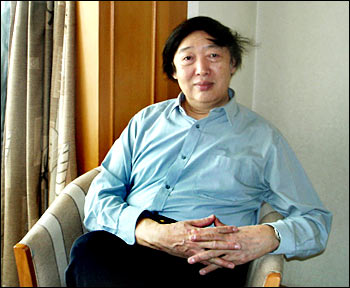| Tools: Save | Print | E-mail | Most Read |
| Legislators Urged to Protect Village Culture |
| Adjust font size: |
Feng Jicai, vice chairman of the China Association for the Promotion of Democracy, called yesterday for more efforts to protect village culture as the country goes through the processes of "building a new socialist countryside," one of the primary tasks of the 11th Five-Year Guidelines for National Economic and Social Development (2006-2010) currently under discussion by China's legislators.
Feng, a writer and painter who is well-known for his devotion to protecting and preserving Chinese folk culture, made the remarks during the Fourth Plenary Session of the 10th National Committee of the Chinese People's Political Consultative Conference (CPPCC), China's top advisory body, currently taking place in Beijing. In an interview with china.org.cn on Monday, Feng said: "Our cultural roots are in the rural areas because China is essentially an agricultural country. The rural population accounts for over two-thirds of the country's total. The intangible cultural heritage and cultural diversity we talk about are found mainly in the rural areas. And more so for ethnic minority culture as most of the ethnic minorities live in rural areas. If their cultures are lost, they will be lost. "I am worried that unless effective protective measures are implemented, we will have a situation where there are no cultural differences. Because of the modernization drive in cities, they all look the same, very monotonous. If rural areas just follow suit, it will be a big loss for our country," Feng added. He said that village culture includes folk customs, folk literature and traditions practiced in different places. "I've been investigating the various folk cultures. I visited many places, and discovered many cultures and traditions whose existence I never even knew. I feel that in the rural areas, what your know is always much less than what you don't know," he added. Feng acknowledged that the government has been trying to enhance the protection of folk culture over the last two years. The State Council, for example, has declared the second Saturday of June Cultural Heritage Day to promote the importance of protecting folk culture. "However, it is far from enough. Villages are disappearing as we speak. The village you saw one day could become a Roman-style garden the next day. Many villages in east China's Jiangsu and Zhejiang provinces have changed a great deal in recent years. Many villages have lost their history and memories. In addition, a large number of cultural heritages are on the brink of extinction because they haven't been passed on to succeeding generations. "As society transforms, it seems inevitable that some culture will be lost. Government support to protect folk culture is crucial, especially support from local governments." During his research into the folk cultures in seven provinces last year, Feng discovered that Wuyuan County, located in the northeast of Jiangxi Province, is a good example of how folk culture can be effectively preserved. It is home to some of the most well preserved ancient architecture in China. The Hui-style ancient buildings, with their pink walls and black tiles, emerge from among the emerald green mountains, clear rivers, green trees and paths that crisscross through the fields and paint a picturesque landscape. Some photographers have described it as the most beautiful village in China. "More important, architects have been contracted to develop building designs based on the old designs. Anyone wanting to build their own house must use one of these designs. When visitors look at Wuyuan from a distance, the first thing they will notice is its harmonious beauty. The people of Wuyuan have found a balance between protecting their folk cultures and keeping pace with modernization." Feng said that a seminar on ancient villages will be held in April in Jiaxing of Zhejiang. "We have invited village heads and scholars to attend the seminar. We want to promote the 'Wuyuan experience'." Profile of Feng Jicai Born in 1942, he joined the China Association for the Promotion of Democracy in 1981. He began his painting career at the Tianjin Calligraphic and Painting Studio. In the 1970s, he taught at a Tianjin school for arts and handicrafts. From 1986 onward, he became more prominently involved with writers' associations. He also worked with the Tianjin branches of the Chinese Society for the Study of Folk Literature and Art as well as the Chinese Writers' Association. He now serves as chairman of the Tianjin Federation of Literary and Arts Circles, vice chairman of the 11th Central Committee of the China Association for the Promotion of Democracy, vice chairman of the China Federation of Literary and Arts Circles, and Standing Committee member of the CPPCC. (China.org.cn by staff reporter Wang Qian, March 7, 2006) |
| Tools: Save | Print | E-mail | Most Read |
 |
| Related Stories |
|
| Product Directory China Search |
Country Search Hot Buys |
